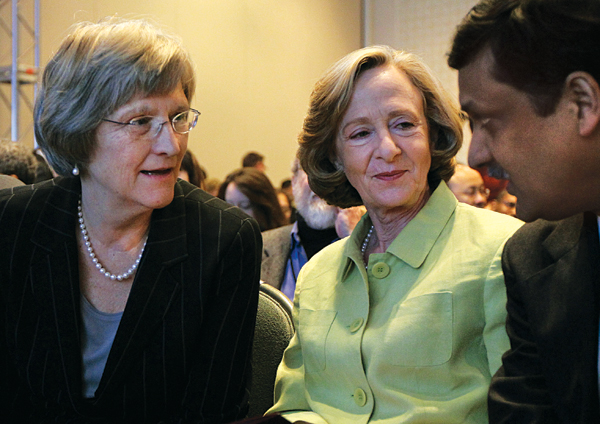With EdX, School’s Out—Forever

Harvard president Drew Gilpin Faust, former MIT president Susan Hockfield, and edX president Anant Agarwal at the May announcement of the new online higher education program. (Photo by Bill Greene/Boston Globe via Getty Images)
Not everyone, however, is happy with the idea of shifting from in-person classes focused on a four-year degree to online tutorials focused on a specific competency. Sylvia Martinez of Generation YES, a nonprofit focused on educational technology, worries that many students, particularly at- risk students, require a more hands-on approach to learning than online lectures provide. She’s also concerned that many people mistake delivering content online with teaching. “People,” she says, “learn through experience, through research and the kinds of experiments they conduct on the MIT campus. You wouldn’t want to go to a doctor who just watched a bunch of videos about open-heart surgery—at least I certainly wouldn’t.”
Another issue is motivation. Martinez and other critics believe that many students need the requirement of showing up for class or the weight of paying a significant amount of money to compel them to do the work. So far, their fears appear justified—online course completion rates have been low. When Coursera, one of the initiatives that came out of Stanford, offered a machine learning class last fall, 104,000 people signed up, but only 13,000, or 12.5 percent, received a certificate of completion. MIT fared even worse. Of the 154,763 students who took the Institute’s electrical circuits course, only 4.6 percent earned a certificate. The rest either dropped out or didn’t pass. (Another way to interpret these numbers is that more than 7,000 people did complete and pass the course—50 percent more than MIT’s entire undergraduate enrollment.)
There’s also a problem with subject matter: EdX’s auto-graders, which are necessary to handle the large volume of students, are currently unable to deal with anything other than objectively right or wrong answers. This works fine for math and science classes, but is problematic when it comes to the humanities. Henry Leitner, an associate dean at Harvard’s Division of Continuing Education, concedes that the technology is not yet good enough to grade essays, but says, “There are a lot of brainstorming sessions taking place right now on how best to do it.”
Meanwhile, if we’re educating the world, there’s a concern that we’re exporting one of the most valuable American assets—our excellent higher education system—and doing so for free. Beyond whatever competitive disadvantages that may put us at, there’s also the potential that developing nations, trying to educate millions of people, will choose not to build costly new brick-and-mortar institutions, potentially undercutting the growth of academic cultures there. Instead, these countries might steer students to the Internet, where they can get a fine education for practically nothing.
And what of all the professors? In June, the education publication Inside Higher Ed and the Babson Survey Research Group released a study showing that 58 percent of faculty members described themselves as more fearful than excited about the future of online education. If one professor can go from reaching 150 students to 150,000, that has the potential to put a lot of educators out of work. And two-thirds of the faculty members surveyed viewed learning outcomes from an online class as generally inferior to those from a face-to-face course. Then again, 80 percent of budget-conscious academic technology administrators said they were more excited than fearful about the new form of learning.
Perhaps most important, the edX experience is remarkably different from the experience of going to college on campus. Agarwal and edX students concede that you lose out on one-on-one time with professors, apprenticeships, mentoring, and research opportunities, not to mention the fun and growth that accompany campus living. Generation YES’s Martinez says she has no doubt that online learning will produce “some favorable outcomes.But will it be the norm? I don’t think so.”